LAW100 Assignment: Analysis of Hunter and McKenna Case (2014)
VerifiedAdded on 2023/01/16
|7
|1314
|83
Case Study
AI Summary
This case study analyzes the High Court case of Hunter and New England Local Health District v McKenna [2014] HCA 44, concerning a civil law dispute. The case revolves around the duty of care owed by a health authority to a third party when releasing a patient with a history of mental illness. The facts involve a patient with schizophrenia who, after being discharged from the hospital, murdered the individual who drove him home. The plaintiff, the victim's family, alleged a breach of duty of care by the health authority. The grounds of appeal contested the existence and breach of such duty, referencing the Civil Liability Act 2002 (CLA) and the Mental Health Act. The High Court, referencing Sullivan v Moody, determined that the health authority did not owe a duty of care in this instance, emphasizing that the authority had acted according to the Mental Health Act 1990 (NSW) and the limitations the act imposed on detaining the patient. The Court's decision underscored the complexities when common law duties clash with statutory powers, ultimately ruling in favor of the defendant and dismissing the claim.
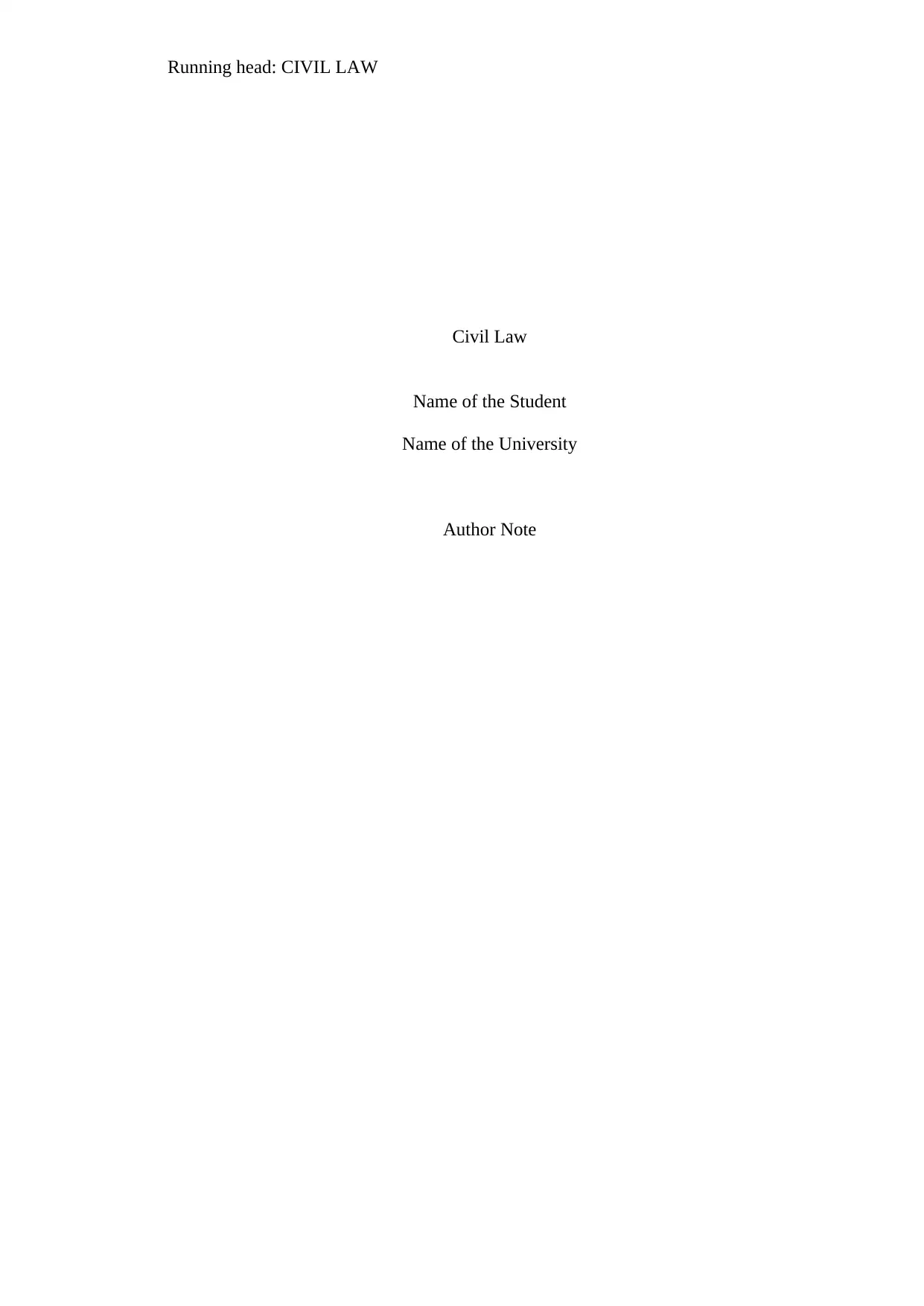
Running head: CIVIL LAW
Civil Law
Name of the Student
Name of the University
Author Note
Civil Law
Name of the Student
Name of the University
Author Note
Paraphrase This Document
Need a fresh take? Get an instant paraphrase of this document with our AI Paraphraser

1CIVIL LAW
Table of Contents
Question 1: Facts of the Case.........................................................................................2
Question 2: Grounds of Appeal......................................................................................2
Question 3: High Court’s Decision................................................................................3
Bibliography...................................................................................................................5
Table of Contents
Question 1: Facts of the Case.........................................................................................2
Question 2: Grounds of Appeal......................................................................................2
Question 3: High Court’s Decision................................................................................3
Bibliography...................................................................................................................5
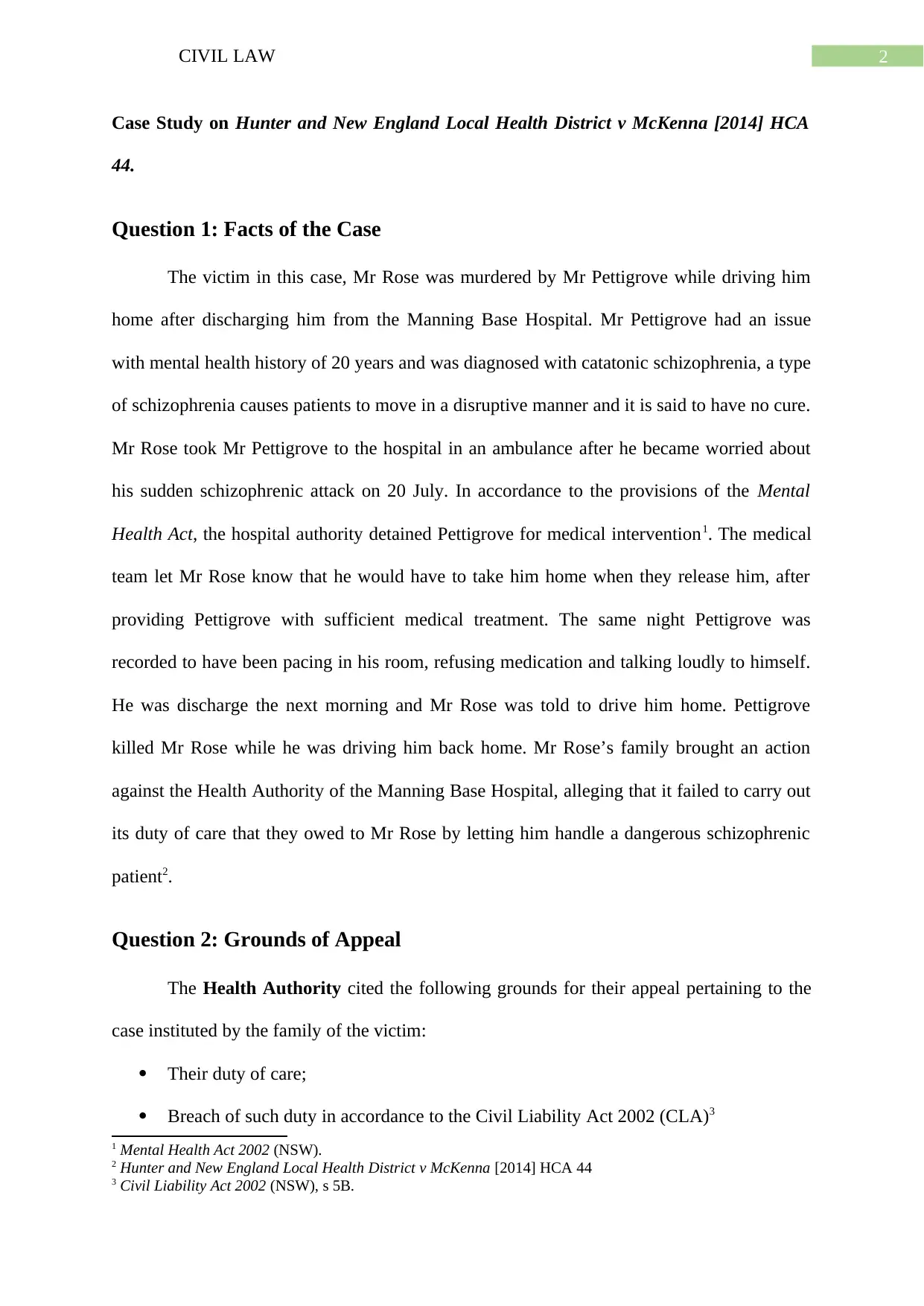
2CIVIL LAW
Case Study on Hunter and New England Local Health District v McKenna [2014] HCA
44.
Question 1: Facts of the Case
The victim in this case, Mr Rose was murdered by Mr Pettigrove while driving him
home after discharging him from the Manning Base Hospital. Mr Pettigrove had an issue
with mental health history of 20 years and was diagnosed with catatonic schizophrenia, a type
of schizophrenia causes patients to move in a disruptive manner and it is said to have no cure.
Mr Rose took Mr Pettigrove to the hospital in an ambulance after he became worried about
his sudden schizophrenic attack on 20 July. In accordance to the provisions of the Mental
Health Act, the hospital authority detained Pettigrove for medical intervention1. The medical
team let Mr Rose know that he would have to take him home when they release him, after
providing Pettigrove with sufficient medical treatment. The same night Pettigrove was
recorded to have been pacing in his room, refusing medication and talking loudly to himself.
He was discharge the next morning and Mr Rose was told to drive him home. Pettigrove
killed Mr Rose while he was driving him back home. Mr Rose’s family brought an action
against the Health Authority of the Manning Base Hospital, alleging that it failed to carry out
its duty of care that they owed to Mr Rose by letting him handle a dangerous schizophrenic
patient2.
Question 2: Grounds of Appeal
The Health Authority cited the following grounds for their appeal pertaining to the
case instituted by the family of the victim:
Their duty of care;
Breach of such duty in accordance to the Civil Liability Act 2002 (CLA)3
1 Mental Health Act 2002 (NSW).
2 Hunter and New England Local Health District v McKenna [2014] HCA 44
3 Civil Liability Act 2002 (NSW), s 5B.
Case Study on Hunter and New England Local Health District v McKenna [2014] HCA
44.
Question 1: Facts of the Case
The victim in this case, Mr Rose was murdered by Mr Pettigrove while driving him
home after discharging him from the Manning Base Hospital. Mr Pettigrove had an issue
with mental health history of 20 years and was diagnosed with catatonic schizophrenia, a type
of schizophrenia causes patients to move in a disruptive manner and it is said to have no cure.
Mr Rose took Mr Pettigrove to the hospital in an ambulance after he became worried about
his sudden schizophrenic attack on 20 July. In accordance to the provisions of the Mental
Health Act, the hospital authority detained Pettigrove for medical intervention1. The medical
team let Mr Rose know that he would have to take him home when they release him, after
providing Pettigrove with sufficient medical treatment. The same night Pettigrove was
recorded to have been pacing in his room, refusing medication and talking loudly to himself.
He was discharge the next morning and Mr Rose was told to drive him home. Pettigrove
killed Mr Rose while he was driving him back home. Mr Rose’s family brought an action
against the Health Authority of the Manning Base Hospital, alleging that it failed to carry out
its duty of care that they owed to Mr Rose by letting him handle a dangerous schizophrenic
patient2.
Question 2: Grounds of Appeal
The Health Authority cited the following grounds for their appeal pertaining to the
case instituted by the family of the victim:
Their duty of care;
Breach of such duty in accordance to the Civil Liability Act 2002 (CLA)3
1 Mental Health Act 2002 (NSW).
2 Hunter and New England Local Health District v McKenna [2014] HCA 44
3 Civil Liability Act 2002 (NSW), s 5B.
⊘ This is a preview!⊘
Do you want full access?
Subscribe today to unlock all pages.

Trusted by 1+ million students worldwide
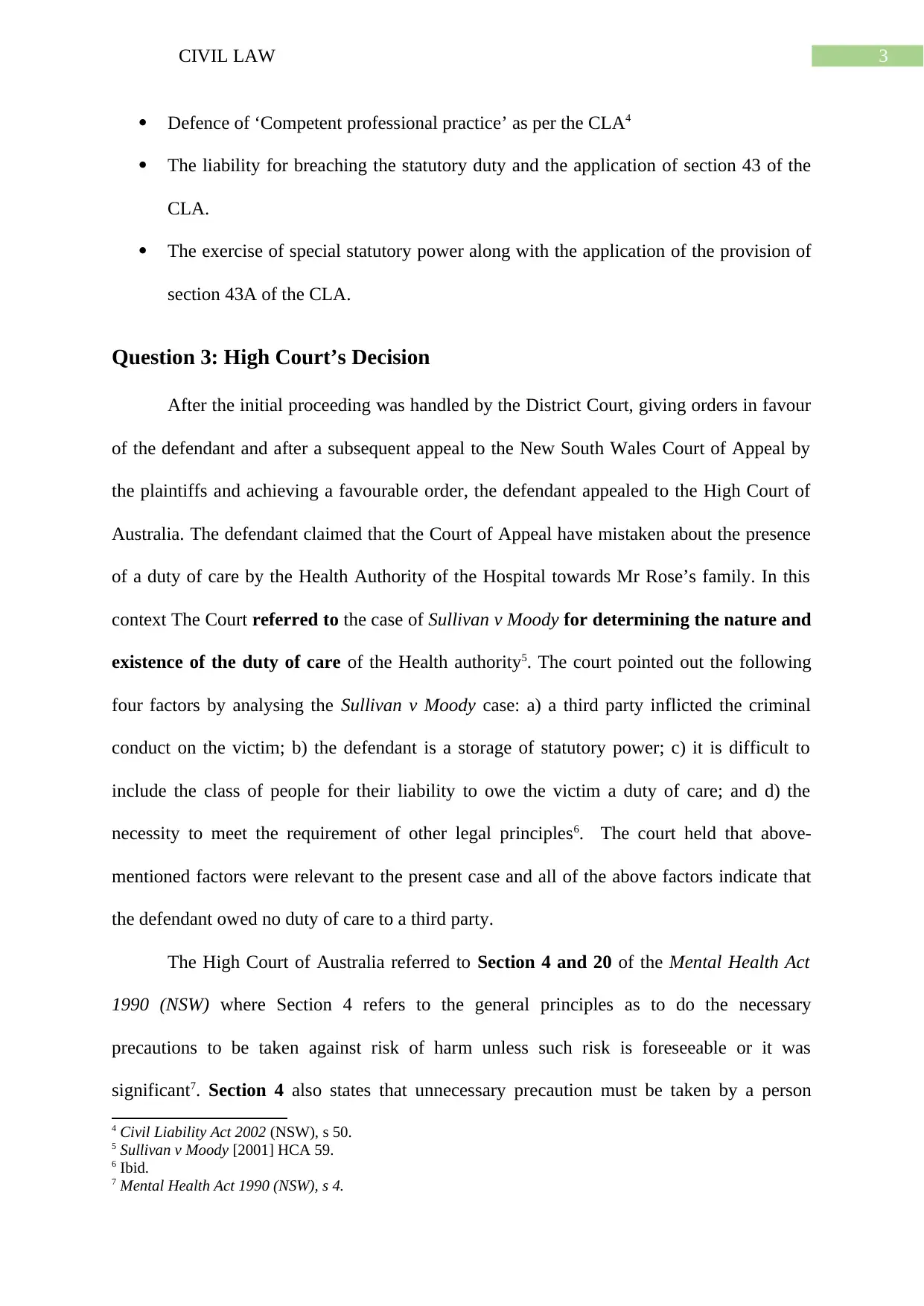
3CIVIL LAW
Defence of ‘Competent professional practice’ as per the CLA4
The liability for breaching the statutory duty and the application of section 43 of the
CLA.
The exercise of special statutory power along with the application of the provision of
section 43A of the CLA.
Question 3: High Court’s Decision
After the initial proceeding was handled by the District Court, giving orders in favour
of the defendant and after a subsequent appeal to the New South Wales Court of Appeal by
the plaintiffs and achieving a favourable order, the defendant appealed to the High Court of
Australia. The defendant claimed that the Court of Appeal have mistaken about the presence
of a duty of care by the Health Authority of the Hospital towards Mr Rose’s family. In this
context The Court referred to the case of Sullivan v Moody for determining the nature and
existence of the duty of care of the Health authority5. The court pointed out the following
four factors by analysing the Sullivan v Moody case: a) a third party inflicted the criminal
conduct on the victim; b) the defendant is a storage of statutory power; c) it is difficult to
include the class of people for their liability to owe the victim a duty of care; and d) the
necessity to meet the requirement of other legal principles6. The court held that above-
mentioned factors were relevant to the present case and all of the above factors indicate that
the defendant owed no duty of care to a third party.
The High Court of Australia referred to Section 4 and 20 of the Mental Health Act
1990 (NSW) where Section 4 refers to the general principles as to do the necessary
precautions to be taken against risk of harm unless such risk is foreseeable or it was
significant7. Section 4 also states that unnecessary precaution must be taken by a person
4 Civil Liability Act 2002 (NSW), s 50.
5 Sullivan v Moody [2001] HCA 59.
6 Ibid.
7 Mental Health Act 1990 (NSW), s 4.
Defence of ‘Competent professional practice’ as per the CLA4
The liability for breaching the statutory duty and the application of section 43 of the
CLA.
The exercise of special statutory power along with the application of the provision of
section 43A of the CLA.
Question 3: High Court’s Decision
After the initial proceeding was handled by the District Court, giving orders in favour
of the defendant and after a subsequent appeal to the New South Wales Court of Appeal by
the plaintiffs and achieving a favourable order, the defendant appealed to the High Court of
Australia. The defendant claimed that the Court of Appeal have mistaken about the presence
of a duty of care by the Health Authority of the Hospital towards Mr Rose’s family. In this
context The Court referred to the case of Sullivan v Moody for determining the nature and
existence of the duty of care of the Health authority5. The court pointed out the following
four factors by analysing the Sullivan v Moody case: a) a third party inflicted the criminal
conduct on the victim; b) the defendant is a storage of statutory power; c) it is difficult to
include the class of people for their liability to owe the victim a duty of care; and d) the
necessity to meet the requirement of other legal principles6. The court held that above-
mentioned factors were relevant to the present case and all of the above factors indicate that
the defendant owed no duty of care to a third party.
The High Court of Australia referred to Section 4 and 20 of the Mental Health Act
1990 (NSW) where Section 4 refers to the general principles as to do the necessary
precautions to be taken against risk of harm unless such risk is foreseeable or it was
significant7. Section 4 also states that unnecessary precaution must be taken by a person
4 Civil Liability Act 2002 (NSW), s 50.
5 Sullivan v Moody [2001] HCA 59.
6 Ibid.
7 Mental Health Act 1990 (NSW), s 4.
Paraphrase This Document
Need a fresh take? Get an instant paraphrase of this document with our AI Paraphraser
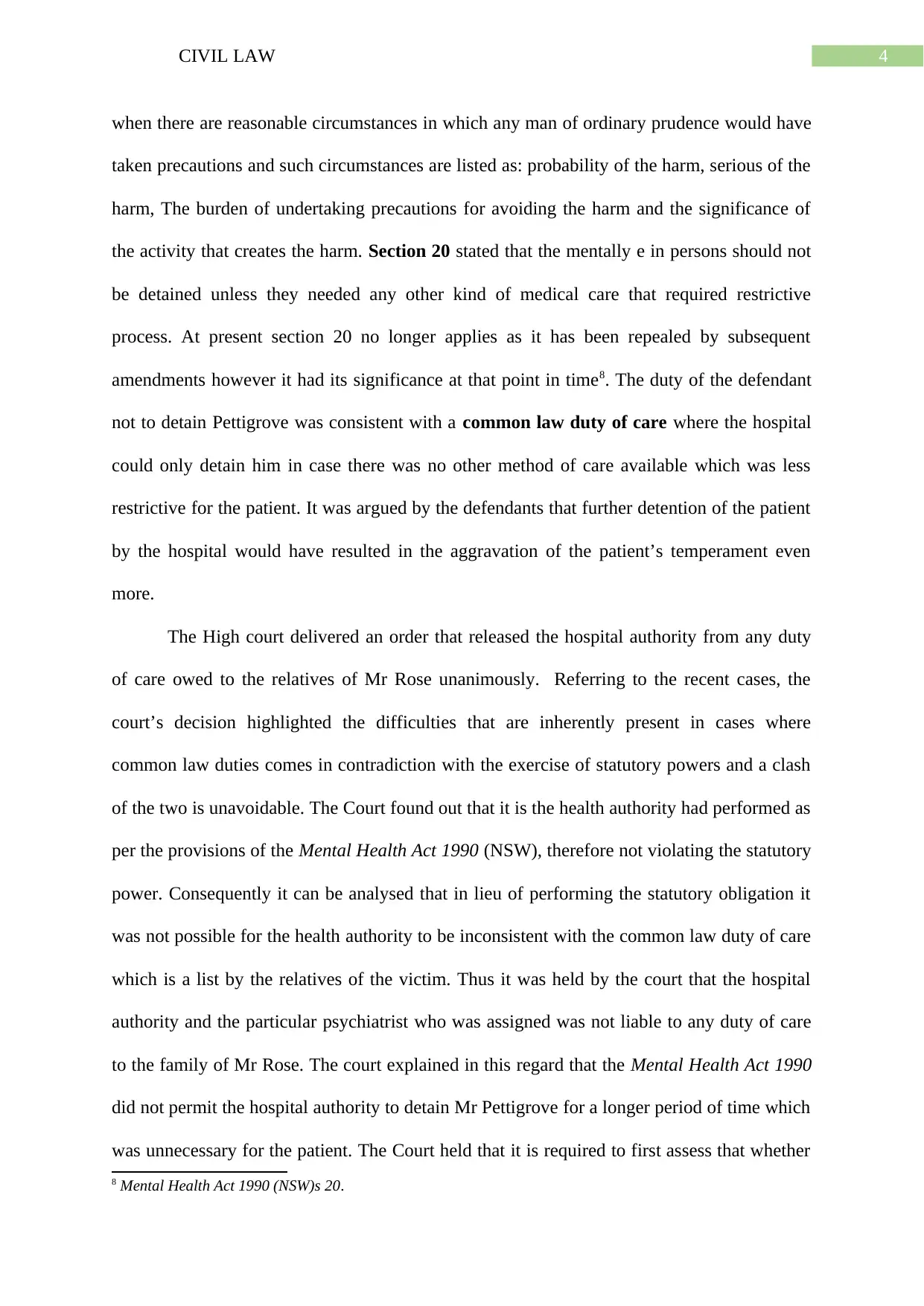
4CIVIL LAW
when there are reasonable circumstances in which any man of ordinary prudence would have
taken precautions and such circumstances are listed as: probability of the harm, serious of the
harm, The burden of undertaking precautions for avoiding the harm and the significance of
the activity that creates the harm. Section 20 stated that the mentally e in persons should not
be detained unless they needed any other kind of medical care that required restrictive
process. At present section 20 no longer applies as it has been repealed by subsequent
amendments however it had its significance at that point in time8. The duty of the defendant
not to detain Pettigrove was consistent with a common law duty of care where the hospital
could only detain him in case there was no other method of care available which was less
restrictive for the patient. It was argued by the defendants that further detention of the patient
by the hospital would have resulted in the aggravation of the patient’s temperament even
more.
The High court delivered an order that released the hospital authority from any duty
of care owed to the relatives of Mr Rose unanimously. Referring to the recent cases, the
court’s decision highlighted the difficulties that are inherently present in cases where
common law duties comes in contradiction with the exercise of statutory powers and a clash
of the two is unavoidable. The Court found out that it is the health authority had performed as
per the provisions of the Mental Health Act 1990 (NSW), therefore not violating the statutory
power. Consequently it can be analysed that in lieu of performing the statutory obligation it
was not possible for the health authority to be inconsistent with the common law duty of care
which is a list by the relatives of the victim. Thus it was held by the court that the hospital
authority and the particular psychiatrist who was assigned was not liable to any duty of care
to the family of Mr Rose. The court explained in this regard that the Mental Health Act 1990
did not permit the hospital authority to detain Mr Pettigrove for a longer period of time which
was unnecessary for the patient. The Court held that it is required to first assess that whether
8 Mental Health Act 1990 (NSW)s 20.
when there are reasonable circumstances in which any man of ordinary prudence would have
taken precautions and such circumstances are listed as: probability of the harm, serious of the
harm, The burden of undertaking precautions for avoiding the harm and the significance of
the activity that creates the harm. Section 20 stated that the mentally e in persons should not
be detained unless they needed any other kind of medical care that required restrictive
process. At present section 20 no longer applies as it has been repealed by subsequent
amendments however it had its significance at that point in time8. The duty of the defendant
not to detain Pettigrove was consistent with a common law duty of care where the hospital
could only detain him in case there was no other method of care available which was less
restrictive for the patient. It was argued by the defendants that further detention of the patient
by the hospital would have resulted in the aggravation of the patient’s temperament even
more.
The High court delivered an order that released the hospital authority from any duty
of care owed to the relatives of Mr Rose unanimously. Referring to the recent cases, the
court’s decision highlighted the difficulties that are inherently present in cases where
common law duties comes in contradiction with the exercise of statutory powers and a clash
of the two is unavoidable. The Court found out that it is the health authority had performed as
per the provisions of the Mental Health Act 1990 (NSW), therefore not violating the statutory
power. Consequently it can be analysed that in lieu of performing the statutory obligation it
was not possible for the health authority to be inconsistent with the common law duty of care
which is a list by the relatives of the victim. Thus it was held by the court that the hospital
authority and the particular psychiatrist who was assigned was not liable to any duty of care
to the family of Mr Rose. The court explained in this regard that the Mental Health Act 1990
did not permit the hospital authority to detain Mr Pettigrove for a longer period of time which
was unnecessary for the patient. The Court held that it is required to first assess that whether
8 Mental Health Act 1990 (NSW)s 20.

5CIVIL LAW
the person involved in murdering the victim is mentally ill or not and if it is proven correct,
then in that case it needed to be determined whether there was any alternative way to deal
with his condition which was less restrictive in nature. The court held that the further
detention would have been inconsistent with the common law duty of care as well.
the person involved in murdering the victim is mentally ill or not and if it is proven correct,
then in that case it needed to be determined whether there was any alternative way to deal
with his condition which was less restrictive in nature. The court held that the further
detention would have been inconsistent with the common law duty of care as well.
⊘ This is a preview!⊘
Do you want full access?
Subscribe today to unlock all pages.

Trusted by 1+ million students worldwide
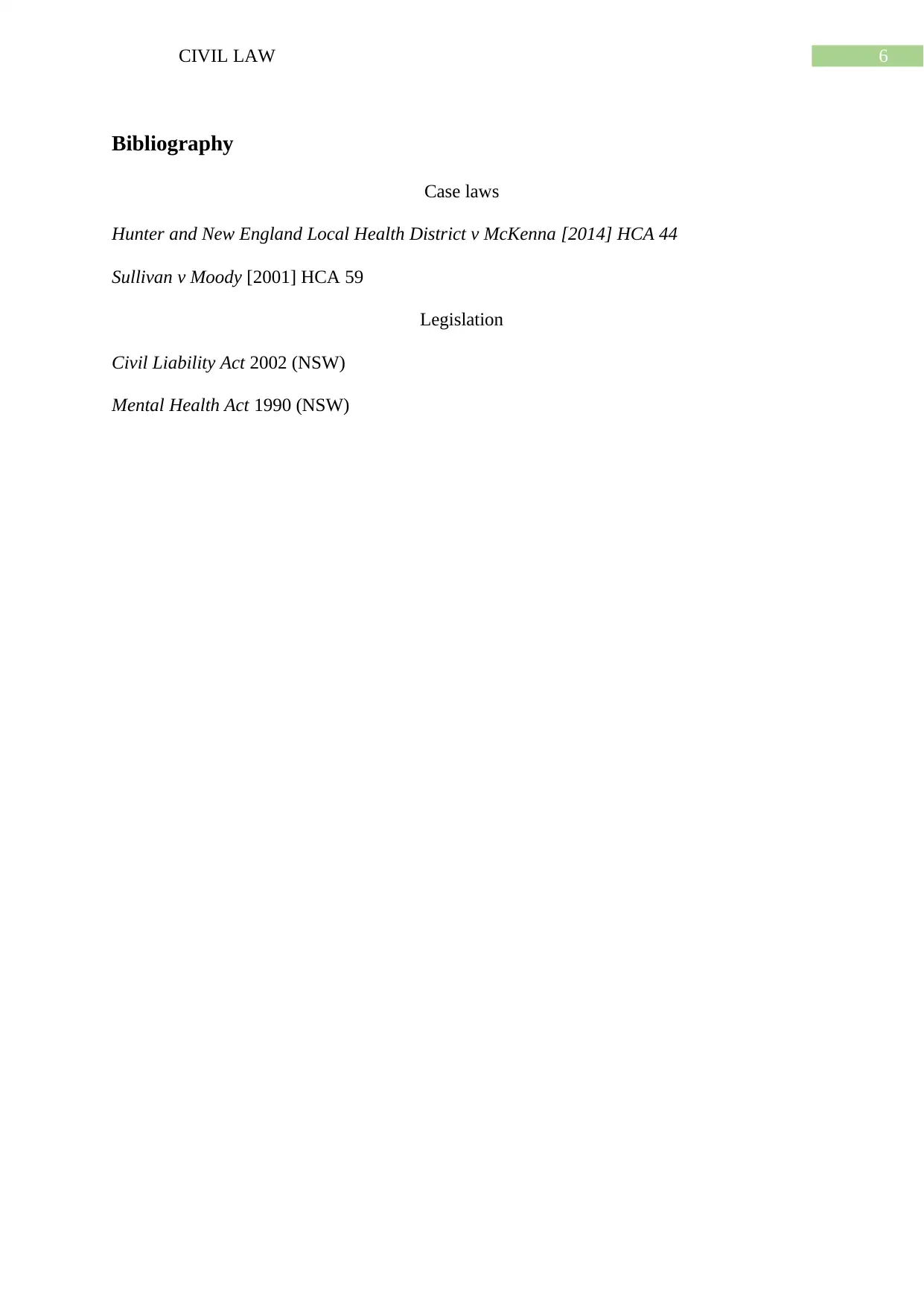
6CIVIL LAW
Bibliography
Case laws
Hunter and New England Local Health District v McKenna [2014] HCA 44
Sullivan v Moody [2001] HCA 59
Legislation
Civil Liability Act 2002 (NSW)
Mental Health Act 1990 (NSW)
Bibliography
Case laws
Hunter and New England Local Health District v McKenna [2014] HCA 44
Sullivan v Moody [2001] HCA 59
Legislation
Civil Liability Act 2002 (NSW)
Mental Health Act 1990 (NSW)
1 out of 7
Your All-in-One AI-Powered Toolkit for Academic Success.
+13062052269
info@desklib.com
Available 24*7 on WhatsApp / Email
![[object Object]](/_next/static/media/star-bottom.7253800d.svg)
Unlock your academic potential
Copyright © 2020–2026 A2Z Services. All Rights Reserved. Developed and managed by ZUCOL.

